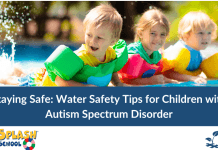Two years ago this month, we received a call that changed our lives.
After months of failed milestones and a barrage of testing, our fears and worry over our baby girl’s health received a name: Angelman Syndrome. Learning your child’s future is far from what you hoped is really hard. We cried, and we grieved.
Two years later, I still experience moments of grief. There are flashes of what our life, what our daughter’s life, might be like without Angelman Syndrome. But I’ve also come to appreciate the gift of a diagnosis. Our daughter’s chromosome deletion is NOT a gift; but knowing its name IS.
Before our daughter’s diagnosis, I joined an online community for parents of children with developmental delays. I remember it as a kind but shadowy place; a room full of parents fumbling around in the dark because most of us didn’t know why our kids were struggling yet. Other parents had an answer, but the disease or genetic condition was so rare it had no name, no community of its own. The not-knowing, for me, was filled with this vague fear and worry. Would our daughter live a typical life? Would she walk and talk? Live to be an adult?
And then, one day, we got that phone call. A deletion of one chromosome 15q11…Angelman Syndrome…don’t google it, she says, just go see the geneticist.

[typography font=”Cantarell” size=”24″ size_format=”px”]The power of a name[/typography]
Receiving a name for our struggle helped a lot. Of course we went and googled it. We researched. We also saw that geneticist. The diagnosis was a key that unlocked doors. It gave doctors and therapists a better map for care. Our insurance coverage improved. We met a community of parents raising kids like ours who cheer one another on and offer support, empathy, answers. And in our hearts, receiving a name gave us something specific to stand down. Fear and worry began giving way to understanding, preparation, acceptance, courage.
So as awful as the diagnosis was, it really was the best gift I never wanted.
Most of you reading this probably won’t have to live through a diagnosis like ours. But I do think most of us find parenting, at times, to be very different than what we expected. Sometimes our children’s lives are very different from what we envisioned. They may make choices we don’t like; or they are hurt—sometimes badly. They may deal with a disability, loss or other challenge we want deeply to spare them from.
It’s easy to want to run away from these things, or ignore them, or minimize them. But I think it’s good to name it. To call the struggle what it is, or to at least try to figure out what it is. When we understand the challenge, we can help love our kids through it; and love drives out fear. When we diagnose a problem, we can also find allies who are dealing with the same kind of struggle, and people who have walked this kind of road ahead of us.
Parenting is not for the faint of heart, but in courage, in naming, we can find hope and help.
















We have a son with a global developmental delay which is, I suspect to be, dyspraxia. We can’t get our insurance to cover the genetic testing to get the official diagnosis. But i have done enough research for me to say that is truly the issue. As such, we have discussed it at length with all members of his health care team and they agree with us. The dark hole that is developmental delay is hard to navigate and isolating. But having an idea of what is causing the delays and how to handle such delays makes it easier and, in my eyes, is a blessing in disguise.